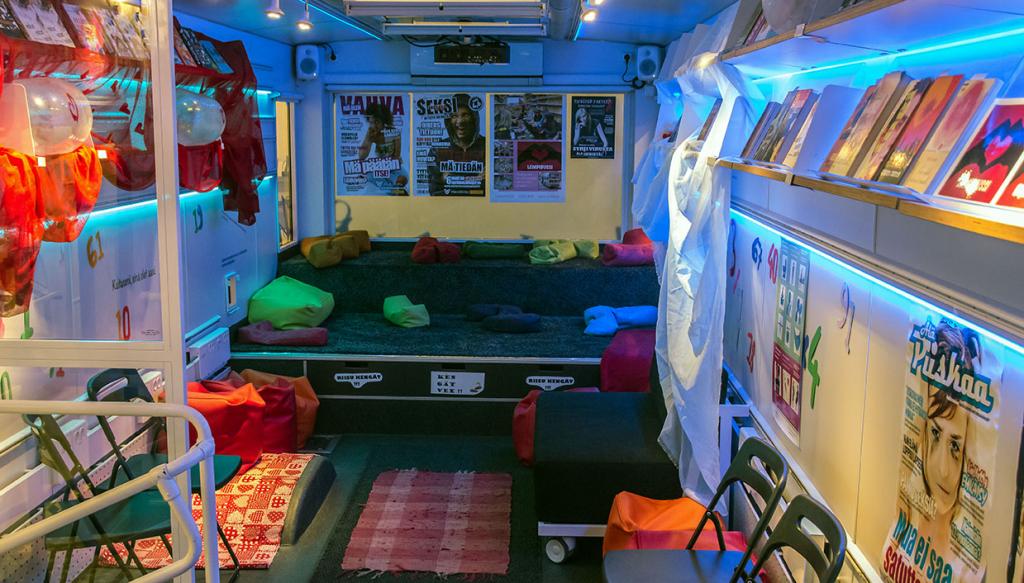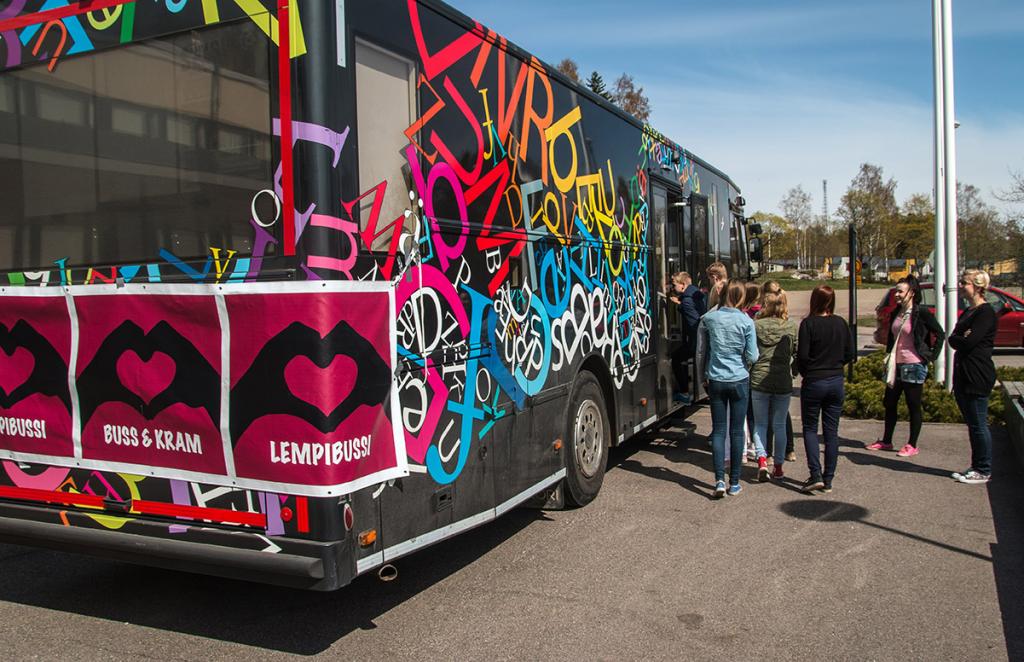The Love & Friendship Bus
The absence of the teacher feels liberating for the pupils. The limited space and the decoration of the bus create an intimate and intense atmosphere.
Abstract:
The Love & Friendship Bus, or mobile library (in Finnish: Lempibussi), is a service the Espoo city library has offered to the junior high schools in Espoo every spring for eight years now. In the bus the teenagers meet a librarian with the good stories, a youth worker who listens and offers advice and a sexual health professional who knows all the facts, and more. The Love mobile library is an example of cooperation across city borders and within a city and municipality. Different professional groups complement each other for the sake of a common goal. In the Love bus the teenagers receive unprejudiced information and participate in a discussion about growing up, sexuality and feelings in a positive form that respects the young.
Introduction
The Love Bus (in Finnish: Lempibussi, Swedish: Buss & Kram ) is a collaboration between the Espoo city library, the Espoo youth work, and the youth work in the city next door, the Centers for girls and boys in Helsinki. Its aim is to provide sexual education for young people. The Love Bus started as a project with state funding between the city libraries of the municipality area of Helsinki, of which Espoo city is one. When the project, and the project money, ended, Espoo decided to continue with the Bus tours. The experiences of the Love & friendship bus, the Lempibussi project, were in Espoo made into a praxis, a normal part of the library´s services for the customers.
The Espoo city library is a modern library institution with different kinds of branch libraries and a unique mobile library (the multipurpose bus Välkky). The libraries function as cultural centers with numerous activities and happenings every day, from Monday to Sunday. The libraries in Espoo are known for their courageous trying out of new forms of library services, for example for children, young people and immigrants. The Love & friendship bus for the junior high schools has already become something of a tradition in the library. For eight years now it has been touring the schools every spring.
In the Love Bus, or mobile library, there is a librarian, a youth worker, a sexual health professional and a collection of books and films about love, feelings, sex, friendship, growing up and gender issues. The book collection isn’t very big, and mostly for show. Experience has taught the staff that the teenagers prefer to receive lists of good reading, and leave the borrowing of the books for later (without the presence of their class mates).
The yearly tour with the mobile library lasts two weeks, with five school classes with 12-15 year olds each day spending one lesson in the bus. The pupils are given a list of the sexual rights of the young which are part of the international human rights. (The Finnish Väestöliitto – the Family Federation of Finland) has modified the rights for young people in Finland.
Read an English summary.

Education in a practical, laid back atmosphere
The program in the bus is a mixture of stories, interaction and hard facts. The list of sexual rights are shared with the pupils and the librarian starts the lesson by reading extracts from fiction for teenagers. Experience has taught the staff that good texts get the attention of the audience, even though young people might not always look as if they are listening:
While reading from the books I look occasionally at the pupils. Some of them giggle with their friends, some fiddle with their shirttails, some look at me. Most of them seem to hear and listen”.
Tanja Avellan, library worker
The extracts from the books are carefully chosen. It might be the voice of a boy, feeling a bit sad and lost just after he has had his first sexual experience, fumbling in the dark with someone he hardly knows. Or it might be the story of a girl who suddenly decides, while petting with that cool, older boy from school, that she doesn’t want to go “all the way”. Afterwards the boy, and his friends at school, bully her for being a “teaser”, calling her a whore.
The question for the group could be: did she do the right thing? For an adult the answer would seem obvious. There is also the list of the sexual rights that have been given to the pupils at the beginning of the discussion, where they can find the statements about the right to not know what you want, the right to change your mind. Still, time and again, school class after school class show that to some of the teenagers the answer is far from obvious.
When one of the twelve year old pupils (often that tough girl or boy of the school class, whose role it is to provoke) declares so called facts about how everybody does anal sex or who is a whore, you have to be able to answer without moralizing and with the right kind of hard facts. That is a job especially for the youth workers and the sexual health workers. You also need to know the right kind of further questions for the group.
The fiction is there to supply the themes. The stories are also there to create a safe space for the teenagers, they are discussing the problems of the protagonists, not their own. And the literature, the extracts from certain books and the book lists about further reading, is there to show young people that the themes and problems are universal, that they are not alone.

The Love & friendship mobile library shows the library working at its best
It is about library staff, who both know their “canon” (the literature that matters, that speaks to its readers) and their customers. What is important here is the interaction with the customers, and the staffs willingness and courage to listen. As Johanna Ponsimo, one of the librarians, notes: “ It is that small tremor in the morning when you are going on tour with the Love Bus: What will happen today?”.
It is also about the library working together with other professionals who contribute with their expertise. When you work with young people it has very much to do with mastering the right language, and knowing the facts.
And finally, it is the library as a space for culture, learning and interaction where everyone is welcome and accepted for who they are. In this case, for the school children, it is also a space outside the school. The schools in Espoo are of a high standard (at the library we love working with them), and the teachers are often ambitious. Still, they represent a certain authority that is absent in the Love Bus:
The absence of the teacher feels liberating for the pupils. The limited space and the decoration of the bus create an intimate and intense atmosphere.” Johanna Ponsimo, Librarian
When the pupils leave the bus they are given lists of book recommendations (mostly fiction, organized under themes like The first time, homosexuality, friendship, The most difficult things etc.) They also get to take with them a condom – with a package specially made for the library, including a couple of poems for special occasions – and brochures with information about youth and health services.
Finland is a country with two official languages, Finnish and Swedish. I am working as a service manager for the mobile library (more desk jobs and meetings, less working directly with the customers), but some years ago I was still working with the Swedish version of the Love bus, called Buss & Kram. Today I feel lucky to be able to still attend the meetings for the yearly Love Bus tour.
There is this group of enthusiastic professionals both efficiently planning the tour, learning from each other and enjoying themselves. Evaluating the previous Love tour and thinking about changes for the coming one. Going through the lists of books, discussing at length, with a lot of laughter, and intense opinions, the removal of some books and the adding of new, more up to date ones. The library staff for the Love bus consists of people from the different libraries in Espoo who work with young people. The youth workers know about the current situation in different schools and among the different groups of young people in Espoo, they are colleagues to the library staff through many different kinds of collaborations over the years. Somebody tells about a difficult situation in the bus and gets support and advice from the others. Talk about what kind of book works for what kind of situation (all the school classes are different and you sense quickly where the discussion is going)
The concept is clear. It all starts with the literature, with a good story (or stories), a story that touches and hits the core (it is not so bad if it stops the young in their tracks and shakes them a bit..). After that it is an intense 45 minutes of group dynamics, asking the right questions and living in the moment. A bus full of young people, stories, adults who listen and give advice for where you can find help when you need it.
“Here is one memorable moment in the Love bus: a paralyzing silence when a small and slender girl, barely noticeable, starts to tell a story about the unwanted intimate approaches of an adult. The anxiety pours from the walls to the floor. And then the warmth, that flows from the comments of the other pupils, and the anger on behalf of the girl. Young people have a strong desire for and sense of justice.”
Johanna Ponsimo, children and youth librarian
Author:
Eva Wilenius
Services manager, Espoo City library
The Outreach Services (Mobile library, Home services; Hospital library)
[email protected]